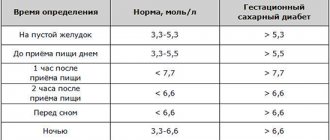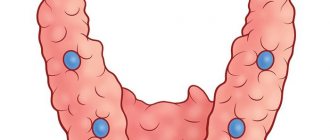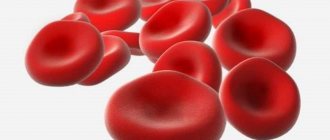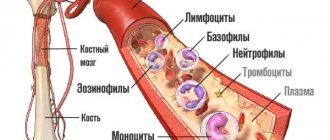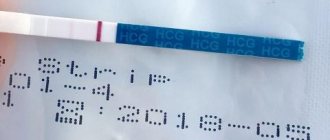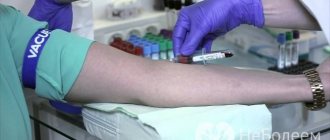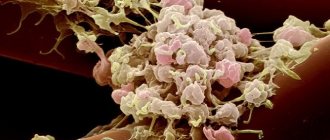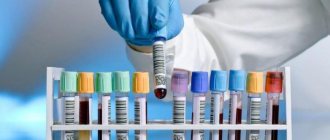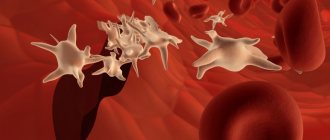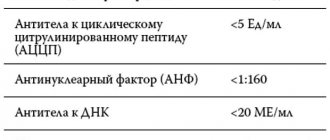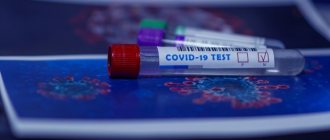Thyrotropin is one of the most important hormones for the functioning of the thyroid gland, produced by the pituitary gland. The entire thyroid balance depends on the concentration of TSH in the blood. If the indicators are abnormal, this indicates hyperfunction or hypofunction of the thyroid gland, depending on the values obtained. To identify possible deviations, you need to find out the norms of the TSH analysis.
Thyroid function increases during this period, causing free T4 and T3 to increase.
The TSH level after removal of the thyroid gland should not change significantly, since the surgical intervention is followed by lifelong selection of hormone replacement drugs based on thyroxine. Also, the indicators remain normal if surgical removal of a benign formation was performed. References – 0.4 – 4 µIU/ml.
If there is a history of an aggressive oncological process, then the TSH norm after removal of the thyroid gland is maintained at a level of up to 0.1 µIU/ml with the help of specially selected medications.
General information about TSH
The content of the article
Thyroid-stimulating hormone is produced by a small gland located on the lower surface of the brain - the pituitary gland. It controls the formation of thyroid hormones (T3, T4) using feedback technology, ensuring a stable concentration of these substances in the blood. Thyroid hormones are considered the main controllers of energy expenditure that occurs in the human body. Maintaining their normal levels is very important for the healthy functioning of almost all systems and organs.
Symptoms of low TSH
Symptoms are determined by the characteristics and causes of endocrine pathology. If TSH is low due to an overactive thyroid gland, this will be indicated by:
- excessive sweating;
- feeling of sand in the eyes;
- high blood pressure;
- weight loss;
- fast speech;
- causeless anxiety;
- aggressiveness;
- dyspnea;
- feeling of heartbeat;
- feeling of heat.
If the TSH concentration is at the lower limit of normal, subclinical hyperthyroidism is diagnosed. The disease is asymptomatic, since TSH does not fall below 0.4 mU/l, and T3 and T4 levels do not exceed the upper threshold of normal.
In hypothalamic-pituitary insufficiency, TSH is low, so the secretory activity of the gland is not stimulated. Because of this, signs of hypothyroidism occur:
- hair loss;
- pathological dry skin;
- weak pulse;
- decrease in temperature;
- apathy;
- chilliness;
- drowsiness;
- fast fatiguability;
- weight gain;
- swelling of the face, etc.
If hypo- and hyperthyroidism manifests itself, you should contact an endocrinologist. Delayed treatment is dangerous for severe complications.
Why is a blood test for the hormone TSH performed?
A doctor may order a patient to take a thyroid-stimulating hormone blood test in the following situations.
- The need to check the condition of the thyroid gland, suspicion of the development of diseases associated with this organ in a person.
- The need for control over the treatment of thyroid diseases.
- To identify female infertility and select the optimal treatment method for this problem.
A blood test for the hormone TSH can be prescribed by a gynecologist or endocrinologist.
Correction of hormonal imbalance
When TSH is elevated, treatment should be etiological. For pituitary adenoma, tactics depend on the size and hormonal activity of the tumor. Surgical removal and radiosurgical treatment are used.
Problems with elevated TSH may occur due to brain damage
In case of thyroid pathology, the choice of treatment is determined by the degree of its dysfunction. Severe hypothyroidism requires replacement therapy to compensate for hormone deficiency. For this purpose, synthetic thyroid drugs are prescribed: Eutyrox, L-Thyroxine, Bagotyrox, L-Thyroxine-Acri, etc. Their use effectively and quickly reduces the level of thyrotropin, but can last for more than one year, sometimes they are taken for life.
The doctor must determine the treatment tactics. Why can't you do it yourself? Because an increase in thyroid-stimulating hormone is possible in completely different pathological conditions that require different approaches to treatment. And you shouldn’t try to do without medications. Folk remedies and special nutrition cannot replace hormones.
Indications for TSH analysis
As a rule, the doctor recommends that the patient take a blood test for the TSH hormone
with an increase in the size of the thyroid gland, in the presence of signs of hypothyroidism, hyperthyroidism.
Symptoms of hyperthyroidism may include:
- increased anxiety;
- cardiopalmus;
- reduction in body weight;
- hand trembling;
- insomnia;
- fatigue, chronic weakness;
- intolerance to bright light;
- diarrhea;
- dryness, swelling around the eyes, bulging, hyperemia;
- reduction in visual acuity.
Also, a TSH test must be performed if a patient has signs of hypothyroidism:
- constipation;
- dry skin;
- cold intolerance;
- hair loss;
- increased fatigue, constant weakness;
- disruptions of the menstrual cycle (in female patients).
Studying the level of thyroid-stimulating hormone in the patient’s body is a mandatory element of monitoring the effectiveness of the chosen treatment for thyroid diseases. TSH levels can also be checked in newborn infants if they belong to a risk group. A blood test for the TSH hormone is not performed for children at the Diana Clinic - it must be done in a children's clinic!
TSH in children: why do all children take this test, and what are its norms?
Every child is required to take a TSH test at least once in his life, although he does this completely unconsciously: blood is taken from every full-term baby 3-4 days after his birth and from every child born prematurely on 13-14 days after his birth. light. Since the veins of a newborn are very small and thin, blood for TSH screening is taken from the heel area, 6-8 drops of blood are applied to filter paper. The results of the analysis are sent to the clinic, where the child will be observed after discharge from the maternity hospital.
This is a required analysis. Young mothers should accept its necessity in relation to children, since it allows them to “catch” congenital abnormalities in the functioning of the thyroid gland in time, before they develop into significant problems with the baby’s health.
Norms for TSH analysis in newborns: 1.1 – 17.0 mU/l.
This indicator persists until the twenty-seventh day of the child’s life. It is easy to see that the spread of standard thyrotropin indicators is large, but if in newborns the hormone reaches the extreme limits of the specified range, it is necessary to conduct additional examinations of the child in order to diagnose endocrinological problems in a timely manner.
The main feature of the TSH norm in children is that the normal level of thyroid-stimulating hormone undergoes significant changes depending on the age of the child. So, from the 28th day of a child’s life until he reaches the age of two and a half months, TSH levels are normal in the range of 0.6-10 mU/l. Further, the norms of the level of thyroid-stimulating hormone in the blood decrease, which can be easily verified by comparing their numerical expressions:
- 2.5 months – 1 year 2 months: 0.4 – 7.0 mU/l;
- 1 year 2 months – 5 years: 0.4 – 6.0 mU/l;
- 5 years – 14 years: 0.4 – 5.0 mU/l;
- Over 14 years old: 0.4 – 4.0 mU/l.
Blood from children is taken, based on the child’s age, from the veins in the feet and hands; In adolescents, blood can be taken as in adults: from a vein in the elbow area.
What the results say
The norm values depend on what indicators are used in a particular laboratory, therefore the interpretation
Only a doctor can
review test results The test may show an abnormal decrease or increase in the patient's TSH level.
Test results for the thyroid-stimulating hormone TSH may fall below normal in the following situations:
- cachexia;
- hyperthyroidism in pregnancy;
- mental illnesses, deviations;
- autoimmune thyroiditis with signs of thyrotoxicosis;
- Plummer's disease (thyrotoxic adenoma);
- TSH-independent thyrotoxicosis;
- diffuse toxic goiter.
Also, TSH levels may increase, exceeding the norm. Elevated
TSH test
results may indicate that the patient has the following problems:
- preeclampsia;
- mental illnesses, disorders;
- lead poisoning;
- adrenal insufficiency;
- lung tumors (thyrotropin-secreting);
- secondary or primary hypothyroidism;
- syndrome of unregulated secretion of thyroid-stimulating hormone;
- Hashimoto's thyroiditis;
- pituitary tumor (basophilic adenoma, thyrotropinoma).
An increase and decrease in thyroid-stimulating hormone levels indicates a malfunction of the patient’s thyroid gland. However, it is often not possible to accurately and correctly determine the cause of deviations using only a single analysis of the degree of concentration of TSH in the body. Therefore, along with this study, doctors often recommend that patients undergo tests for
triiodothyronine (T3), thyroxine
(T4).
What are the health risks of low TSH?
Low thyrotropin due to hypothalamic-pituitary insufficiency does not pose a serious health hazard. But a decrease in TSH due to an overactive thyroid gland is fraught with:
- myocardial dystrophy;
- anorexia;
- vegetative-vascular dystonia;
- thyroid diabetes;
- protrusion of eyeballs;
- adrenal insufficiency;
- blindness;
- osteoporosis;
- immunodeficiency.
Hormonal imbalance in a pregnant woman is sometimes caused by gestosis, which is manifested by increased blood pressure and convulsions. The pathology poses a danger to both the mother and the fetus.
If thyroid-stimulating hormone is below normal and its level ranges from 0.05 mU/l to 0.1 mU/l, you need to take thyreostatics. Ignoring the problem is dangerous due to thyrotoxic crisis and death.
How much does a TSH test cost?
Price
Testing
for thyroid-stimulating hormone
depends on the laboratory in which it is taken. At the Diana Clinic, a blood test for TSH without taking into account the cost of the discount is:
| [08-118] | Thyroid-stimulating hormone (TSH) | 400 rub. |
The cost of tests for other hormones can be found in the price list HERE. In the section “Blood Hormones”.
ADDITIONAL SERVICES AND ANALYSIS FOR TSH HORMONE ANALYSIS
Causes
The reasons for the increase in thyroid-stimulating hormone are due to dysfunction of the thyroid gland .
One of the important catalysts of the pathological process of the thyroid gland is the insufficient intake of iodine in the human body, and the development of diffuse non-toxic goiter against its background.
Thyroid diseases can also be caused by other factors:
- Genetic – chromosomal abnormalities that increase the threshold of sensitivity to iodine deficiency.
- Bacterial and viral infections.
- The influence of external negative factors: radiation exposure, carcinogens that lead to the development of thyroid tumors.
TSH may rise in the blood serum for some time after enhanced iodine therapy.
What can affect the analysis results
As part of proper preparation for the test
blood test for TSH, the patient is obliged to exclude factors that can distort the results and lead to their incorrect
interpretation.
- The level of concentration of the TSH substance in the body reflects the picture in the “thyroid gland – pituitary gland” system on average over the last 5-6 weeks. Therefore, control diagnostics of thyroid-stimulating hormone levels in the blood should be carried out 2 months after the dose of drugs that can change the level of hormones is adjusted. Of course, such adjustments are made together with the attending physician.
- of TSH
in the body exceeding
the norm
in the
analysis
results: atenolol, motilium, phenytoin, valproic acid, amiodarone, propanolol, prednisolone, as well as methimazole, lovastatin, rifampicin, metoclopramide, iodides, and so on. The advisability of refusing them must be discussed with your doctor. - The level of concentration of the hormone TSH in the body can change if the patient experiences emotional shock or severe stress. Also, indicators may be distorted due to serious physical activity.
- Infectious diseases that the patient has recently suffered can change the indicators of this substance. You must notify your doctor about this.
- The concentration of TSH in the body may vary throughout the day. Therefore, if thyroid-stimulating hormone concentrations are being monitored, it is important to test for TSH hormone
at the same time of day. - If the purpose of the analysis is to monitor the effectiveness of the therapy, taking medications prescribed by the doctor is suspended immediately on the day of the study.
- TSH levels can increase in women in the third trimester of pregnancy.
What danger does a high TSH level pose?
If quick measures are taken to reduce thyroid-stimulating hormone to the required level, there is no threat to human health. And if you ignore the symptoms of such a problem, first of all, a person’s mood and general well-being will gradually deteriorate. Elevated TSH levels will lead to slower metabolism, weight gain, diabetes and hypertension.
Elevated levels of TSH in the blood lead to slower metabolism
Important ! Hyperthyroidism in a small percentage of cases ends in death - only in very advanced cases. The most likely threat lies in hypertension and diabetes.
Other important rules for preparing for a blood test for the TSH hormone
- It is highly advisable to donate blood for any hormonal analysis, including TSH, in the morning, always on an empty stomach. If it is not possible to submit biological material for research in the morning, this must be done at least 5 hours after eating.
- It is recommended to establish physical and psycho-emotional comfort a day before blood sampling. You can’t play sports (even light ones) or be nervous.
- Doctors do not recommend visiting a bathhouse or sauna or taking a hot bath in preparation for a thyroid-stimulating hormone test; overheating can distort the results of the study. Hypothermia is also prohibited, so activities such as going winter fishing or swimming in an ice hole are not allowed.
- 48 hours before the test, avoid drinking alcoholic beverages. Ideally, you should refrain from smoking for 24 hours before the test; if this is difficult, you should not smoke for 2-3 hours before taking blood.
- It is not recommended to donate blood for laboratory analysis immediately after an instrumental examination, physiotherapeutic procedures, ultrasound and x-ray examinations, massage and other medical procedures.
A blood test for the TSH hormone can only be taken in a good clinic!
What are they, the norms of thyrotropin?
This is a simple question, which, however, is not very easy to answer, since TSH norms vary.
The technical side of the analysis, at least from the patient's side, is not difficult. In an adult, blood is taken from the medial or lateral vein. In the event that the veins are poorly visible even after clenching/unclenching the fist prior to needle insertion, blood can also be collected on the wrist or the back of the hand.
Thyrotropin levels are measured in µU/ml or in honey/l. A blood test for thyroid-stimulating hormone is quite popular (due to the “popularity” of thyroid problems), so you can take a blood test for thyrotropin and get a transcript of its result in any medical institution that has a laboratory, be it a clinic, a hospital, or a medical center. TSH screening, mandatory for all newborns, is done in the maternity hospital.
When we receive the result, we see not only our personal TSH level in the blood, but also its so-called reference values, that is, the range of numerical expressions of the analysis result that is normative. Reference (or, as they are sometimes called, reference) values are standards that are obtained as a result of a mass examination of a healthy population. For example, a result of 3.0 mU/L was obtained, and the reference values for this analysis are 0.4-4.0 mU/L. This means that this personal result is quite within the norm.
There are often cases when, for one reason or another, the analysis is retaken in another laboratory. A situation may arise in which the reference values of the initial analysis and its retake turn out to be different. This is normal and is mainly explained by the fact that different medical institutions work with different equipment and rely on different methods of analysis, for example, using different reagents.
You should know that the level of thyrotropin in the blood depends on a number of factors. There is no single normative indicator that can be applied to everyone taking this test. The amount of TSH is not the same in people of different age and gender groups; it can change under certain physiological conditions of the body (for example, during pregnancy). It is known that the normal limits for TSH production vary even depending on climate; a number of studies also show that there is a certain dependence of the concentration of thyroid-stimulating hormone on the ethnic group to which the subject belongs (for example, as part of scientific activities, a comparison was made of the level of TSH in the blood of Russian and Greek women with the detection of a larger amount of thyrotropin in the blood of the latter). Finally, hormone levels fluctuate and change throughout the day.
Before the TSH test
It is advisable to come to the laboratory about an hour or at least half an hour before taking blood. The patient should sit, rest, and relax. Concurrent testing for T4 hormones may be required.
T3 together with
TSH
in order for the doctor to obtain a complete picture of the disease; the rules for preparing for these studies are almost the same.
Women can donate blood for TSH, regardless of the phase of the menstrual cycle, unless otherwise indicated by the attending physician. About how soon a hormone test is done,
can be obtained from the specific laboratory.
TSH in women is low - what does this mean?
An experienced endocrinologist can assume a decrease in TSH in a patient if he experiences lethargy, drowsiness, headaches, or complains of a depressive state accompanied by nervous breakdowns.
A person experiences an increase in body temperature and blood pressure, an increased heart rate, and begins to sweat heavily, especially during sleep. There is memory deterioration, swelling, loss of total weight, tremors in the arms and legs, and women are characterized by disruptions in the menstrual cycle.
A decrease in the level of TSH in the blood may indicate possible pathologies:
- neoplasm in the thyroid gland;
- decreased pituitary function;
- death of pituitary cells in women after childbirth;
- excess of hormones due to uncontrolled use of hormonal drugs;
- Plummer's disease;
- toxic goiter;
- pituitary injury;
- neoplasm in the pituitary gland;
- mental illness.
Also, a low TSH level can be caused by fasting or a low-calorie diet, or severe stress.
However, sometimes a lower TSH level or its increased values only indicate that the patient did not follow all the doctor’s instructions during the period of preparation for donating blood for analysis.
How to decipher a TSH analysis
Thyroid-stimulating hormone is known as the main regulator of the thyroid gland; if a patient is suspected of having a disease associated with it, a test for it is required. The interpretation of the analysis results should be done by a specialist, but knowledge of the basic values of the norm will allow the patient to independently gain an understanding of his problem.
Thyroid-stimulating hormone: where does it come from, how does it affect our health?
Thyrotropin is a hormone that is the main regulator of the thyroid gland, the importance of which is difficult to overestimate: in fact, it, with the nervous and immune systems, forms a triumvirate that regulates the work of all vital organs. Now you can easily imagine the role of thyrotropin in human life. TSH is not the only thyroid hormone, but it is the one that responds most quickly to all changes in its activity. Therefore, TSH analysis is the main one when you urgently need to understand whether the thyroid gland, which suddenly malfunctions, is to blame for our poor health. And this, unfortunately, happens often: all regions of our country are located near the sea, and, as a result, a large percentage of the Russian population experiences iodine deficiency, without which normal functioning of the thyroid gland is impossible.
Although thyrotropin is a thyroid hormone, it is not synthesized in it at all, but on a higher tier: the endocrine gland, the pituitary gland, which is located at the lower base of the brain, is responsible for its production. Growth, metabolism, development of the body - this is what the pituitary gland is responsible for. All these processes are impossible without the production of hormones, which, even in low concentrations, have a huge impact on our life.
Thyrotropin, being a tropic hormone (that is, a hormone produced in the pituitary gland - more precisely, in its anterior part), does not act on its own, but in conjunction with other substances. Without it, the production of the hormones triiodothyronine (abbreviated as T3) and thyroxine (T4) is impossible. These hormones bear a heavy burden:
- Participate in supporting the respiratory center;
- Stimulate thinking;
- Coordinate cardiac activity;
- Increase motor activity;
- Activate oxygen absorption by organs.
Thyroid-stimulating hormone, thyroxine and triiodothyronine do not simply coexist: there is an inverse relationship between them. If, for example, due to certain unfavorable conditions, the production of thyroxine begins to become too intense, the level of thyrotropin in the blood will decrease and the thyroid gland will not be able to function fully. If the production of T3 and T4 is reduced, then the amount of TSH increases. Maybe a large amount of thyrotropin is good? Not at all, because we are talking about serious hormonal disorders: hypothyroidism and hyperthyroidism.
In hypothyroidism, due to too much thyrotropin in the blood, little thyroxine and triiodothyronine are produced. The metabolic process in the body is disrupted, which manifests itself in the form of signs:
- Rapid weight gain, seemingly with a normal diet;
- Loss of appetite;
- Flatulence;
- Frequent constipation;
- Brittle and dry hair, seborrhea and alopecia;
- Unreasonable feeling of freezing;
- Slow pulse (less than 50 beats per minute when the norm is 60-80 beats per minute);
- High cholesterol;
- Irregular menstruation in women;
- Problems with potency in men;
- Reduced pressure compared to working pressure;
- Slowness of speech and thinking;
- Insomnia, interrupted sleep;
- Breathing, hearing problems, hoarseness of voice against the background of general swelling of the face;
- Depression;
- Dry skin;
- Acquiring a icteric tint to the skin;
- Swelling of the limbs.
Hyperthyroidism, on the contrary, is an overly intense production of triiodothyronine and thyroxine with a low level of thyrotropin. Symptoms of hyperthyroidism, as in the case of hyperthyroidism, indicate a metabolic disorder:
- Enlarged thyroid gland;
- Sudden weight loss even in the absence of any dietary changes;
- Constantly strong appetite;
- Constipation or, conversely, diarrhea;
- Flatulence;
- Vomit;
- Weakness of hair;
- Constantly manifested brittle nails;
- Intense gray hair beyond age;
- Muscle weakness;
- Increased fatigue;
- Arrhythmia;
- Eye problems (bulging eyes and photophobia are typical);
- Increased pressure compared to working pressure;
- Unreasonable excitability (anxiety, fears);
- Irregular menstruation in women;
- Problems with potency in men;
- Hand tremors;
- Sleep disorders;
- Thinning of the skin.
All these symptoms indicate the importance of maintaining hormonal balance in the body, in which thyrotropin plays an important role.
How to interpret blood tests for the hormone TSH
Norm of the hormone TSH
test
results do not depend on the gender of the patient. However, the indicators vary depending on the norm, and the presence of pregnancy and trimester also have an impact. Normal results for each age group are indicated in µIU/ml.
- The normal level of thyroid-stimulating hormone for newborn babies is 0.7-15.2.
- Normal values for children aged 6 days - 3 months are 0.72 - 11.0.
- For children aged 4-12 months, the normal concentration of TSH in the body can be 0.73-8.35.
- Normal values of thyroid-stimulating hormone for children from one to six years old are in the range of 0.7-5.97.
- If a child is aged 7-11 years, normal levels of the TSH hormone for him are 0.6-4.84.
- For adolescents aged 12-18 years, the normal concentration of this substance in the body is 0.5-4.3.
- For people over 18 years of age, the normal levels of thyroid-stimulating hormone are in the range of 0.27-4.2.
TSH is elevated - what does this mean?
An increase in TSH occurs when thyroid hormones decrease, and often indicates iodine deficiency in the body. By analyzing the amount of thyroid-stimulating hormone, thyroid pathologies :
- Hypothyroidism is a condition characterized by a lack of thyroid hormones.
- Thyroiditis is inflammation of the thyroid gland.
- Pituitary tumor.
- Tumors of the lung, breast.
- Endemic goiter.
- Thyroid cancer.
The content of TSH in the blood serum is determined by serological analysis. Normally, the hormone content varies from 0.24 – 3.8 mIU/l .
Interpretation of tests and pregnancy
The level of concentration of thyroid-stimulating hormone in the female body may change due to pregnancy, which must be taken into account when interpreting the results of a blood test for TSH.
- Normal TSH levels before the 12th week of pregnancy are 0.35 – 2.5 µIU/ml.
- The level of this substance in the blood of a pregnant woman at 12-24 weeks of pregnancy is in the range of 0.35 - 3 µIU/ml.
- At 24-42 weeks of pregnancy the indicators are similar – 0.35 – 3 µIU/ml. During this period, it is also possible that the results will be slightly higher than normal.
Normal during pregnancy
At the stage of pregnancy planning, the content of thyroid-stimulating hormone in a woman’s body, the TSH norm, is a very important factor, since an increase in thyroid-stimulating hormone above 2.5 mIU/liter reduces the possibility of conception to a minimum. For this reason, in case of infertility and frequent miscarriages, it is necessary to conduct an analysis to determine the concentration of TSH.
For up to 15 weeks, all the fetal needs for thyroid hormones are provided by the mother’s body. A lack of thyroid hormones during this period can negatively affect the development of the unborn baby. Therefore, for women at risk for thyroid conditions, it is very important to determine its function before pregnancy or in the early stages.
A natural reason for an increase in TSH in the first trimester is an increase in the level of estrogen in the blood, which causes a decrease in free T4 and a compensatory increase in TSH.
During pregnancy, a woman's body produces a specific hormone - human chorionic gonadotropin (hCG).
It is often called the “pregnancy hormone”. Gonadotropin has a stimulating effect on the formation of thyroxine and triiodothyronine, which naturally leads to a decrease in TSH in a woman’s blood. Changes in TSH in women during pregnancy
| Trimesters of pregnancy | Norm, mIU/l |
| 1st | 0,1 — 2,5 |
| 2nd | 0,3 — 2,8 |
| 3rd | 0,4 — 3,5 |
If during the second and third trimester the TSH level rises above normal (with a simultaneous decrease in T4 and T3 levels), this may indicate the development of hypothyroidism.
During the postpartum period, it is also necessary to monitor the TSH, T3 and T4 levels to exclude postpartum thyroiditis, the manifestation of which is similar to the symptoms of postpartum depression, fatigue and lack of sleep.
Postpartum thyroiditis occurs in 3-5% of women and is the result of a malfunction of the immune system and the occurrence of an inflammatory process in the thyroid gland. However, there is a possibility that 10-12 months after birth, the functioning of the endocrine and immune systems will return to normal.
What does an elevated TSH mean?
If the indicators obtained as a result of a blood test for TSH
, exceed the norm, this may indicate that the patient has serious illnesses. The concentration of thyroid-stimulating hormone may increase in the following cases:
- pituitary tumor (for example, basophilic adenoma, thyrotropinoma);
- primary, secondary hypothyroidism;
- syndrome of unregulated secretion of the hormone TSH;
- Hashimoto's thyroiditis;
- adrenal insufficiency;
- lead poisoning;
- preeclampsia;
- thyrotropin-secreting lung tumors
- mental disorders, diseases.
It must also be remembered that the TSH
in the body may increase in the
test
results if the patient takes the following drugs as part of treatment: rifampicin, diphenin, methimazole, iodides, furosemides, metoclopramide, aminoglutethimide, benserazide, phenothiazine derivatives, morphine, prednisolone, calcitonin, as well as amiodarone, propranolone, valproic acid , metoprolol, motilium, clomiphene, atenolol and phenytoin.
Thyroid-stimulating hormone in men: is its normal level constant?
Yes, we can say that the TSH norm in men is a more or less constant value. It is expressed in the following numerical indicators:
- 5 years – 50 years: 0.4 – 4.0 mU/l;
- 50 years or more: 0.4 – 9.0 mU/l.
Let us present here an interesting fact indicating the dependence of the hormone level on the time of year: in men over 50 years of age, the highest concentration of TSH in the blood manifests itself in December. Here's a little hormonal whim.
In general, men do not experience fluctuations in TSH levels as often as women, and this is understandable: after all, the male body, although it performs a reproductive function, is not designed to carry an embryo and give birth. And thyroid dysfunction is relatively rare among them: most endocrinologist patients are women. However, the concentration of thyrotropin may change in a man, for example, due to early baldness or loss of libido. Then, of course, the doctor prescribes additional examinations.
What does a decrease in TSH norm mean?
If the interpretation of test results for the hormone TSH
shows results that are below normal, the patient may assume the following problems and diseases:
- hyperthyroidism in pregnancy;
- thyrotoxic adenoma (also called Plummer's disease);
- diffuse toxic goiter;
- autoimmune thyroiditis with signs of thyrotoxicosis;
- TSH-independent thyrotoxicosis;
- cachexia;
- mental illnesses, disorders.
Causes of increased thyrotropin
A slight increase in the concentration of TSH in the blood is possible in the following cases:
- chronic fatigue and lack of sleep;
- consuming large amounts of iodine;
- excessive physical activity;
- stressful situations, emotional arousal;
- improper preparation for the study.
An increased level of the hormone can be determined if a person has severe mental and somatic illnesses.
If the test result shows a significant excess of the norm, this may indicate that the patient has:
- hypothyroidism;
- inflammatory processes in the thyroid gland;
- renal failure;
- diseases of the central nervous system;
- neoplasms;
- gestosis during pregnancy;
- lead poisoning.
A high TSH level may indicate tissue resistance to thyroid hormones. In addition, this can be observed after cholecystectomy (removal of the gallbladder), hemodialysis, the use of anticonvulsants, beta-blockers, antipsychotics, and antiemetic drugs.
How to decipher the results of several tests for the hormone TSH
Deviations in the level of concentration of thyroid-stimulating hormone in the patient’s body from the norm in one direction or another directly indicate only malfunctions in the functioning of the thyroid gland. To determine the exact cause of such failures, the doctor, in most cases, together with a TSH test
prescribes tests for the patient for levels T3,
T4.
- Primary hypothyroidism is determined by normal or decreased T3 and T4, increased TSH.
- Secondary hypothyroidism is diagnosed when T3, T4, and TSH levels are reduced.
- Hyperthyroidism is determined by increased T3, T4, decreased TSH.
TPO-AT tests may also be required for accurate diagnosis of hypothyroidism or hyperthyroidism.
, AT-TG, exceeding the norm indicates subacute or autoimmune thyroiditis.
How to increase thyroid-stimulating hormone
Low TSH levels occur in pathologies at the level of the thyroid gland and brain. In both cases, the treatment methods will be very different.
Diet and general recommendations
If TSH is low and T3 and T4 levels are high, iodine-containing foods are excluded from the diet:
- shrimps;
- seaweed;
- lobsters;
- crabs;
- red fish, etc.
They contain iodine, which is involved in the production of thyroid hormones.
Seafood is contraindicated for thyrotoxicosis and recommended for hypothyroidism.
To restore thyroid function, the menu includes:
- products with selenium and cobalt - Brussels sprouts, gooseberries, rose hips, beets, pumpkin;
- teas with medicinal herbs - hops, angelica root, cut grass (parmelia);
- adaptogenic plants – naked licorice, rosea rhodiola, leuzea.
People with low thyrotropin levels should avoid fatty foods and alcohol and stop smoking.
Medications
An overactive thyroid gland should be treated with antithyroid drugs (thyreostatics) - drugs that inhibit the synthesis of T3 and T4. The most effective means include:
- Propycyl;
- Tyrosol;
- Thiamazole;
- Metizol;
- Mercazolil.
Thyrostatics are prescribed by a doctor when thyrotropin is low due to excess production of T3 and T4.
Overdose is dangerous: hypothyroid coma and death. If a decrease in TSH levels is caused by hypothalamic-pituitary insufficiency, the concentration of thyroid hormones falls. To maintain thyroid function, you need to take Eutirox and iodine-containing products:
- Iodomarin;
- Iodine-Active;
- Yod-Normil;
- Yodex;
- Antistrumin.
In cases of severe hypothyroidism, hormone replacement therapy is prescribed. Patients are prescribed synthetic analogues of T3 and T4 - L-Thyroxine, Thyrocomb, Liothyronine, etc.
Folk remedies
To increase TSH, decoctions and infusions of medicinal herbs are used. The following have pronounced stimulating properties:
- buckthorn;
- chamomile;
- rose hip;
- St. John's wort.
The herbal drink is prepared simply:
- 2 tbsp. l. the raw materials are steamed with 1 liter of boiling water;
- leave for 2-3 hours;
- filter through cheesecloth.
Take 100 ml infusion half an hour before meals three to four times a day.
Reasons for decreased thyrotropin
Slight fluctuations in a woman's TSH level may occur depending on the phase of the menstrual cycle. During pregnancy, as a rule, there is a slight decrease, which is normal. An increase in thyrotropin during pregnancy can lead to the development of complications (stagnation of fetal development, spontaneous termination of pregnancy).
A decrease in the level of thyroid-stimulating hormone is possible in the following cases:
- malnutrition (including following strict diets to lose weight);
- the use of certain medications (anabolic steroids, beta-agonists, drugs for the treatment of hyperprolactinemia);
- uncontrolled use of hormonal drugs;
- stressful situations;
- severe disease in old age.
A significant decrease in the concentration of thyrotropin in the blood is possible if the patient has meningitis, encephalitis, thyroid neoplasms, thyrotoxicosis, Itsenko-Cushing syndrome, diffuse toxic goiter, depression.
Thyrotropin may decrease with lesions of the hypothalamus and/or pituitary gland. The patient's thyroid gland can function normally. Most often, such pathological conditions are observed when:
- neoplasms of the pituitary gland, hypothalamus, brain;
- traumatic brain injuries;
- irradiation;
- surgical intervention in the brain area;
- hypophysitis.
Symptoms of Imbalance
Hormonal disorders can be asymptomatic or asymptomatic for a long time.
The following symptoms are characteristic of an increase in the level of thyrotropin in the blood:
- daytime sleepiness;
- apathy;
- cognitive disorders (memory impairment and impaired concentration);
- depression;
- decreased blood pressure;
- loss of appetite;
- menstrual irregularities;
- decreased sex drive;
- voice change;
- weight gain;
- convulsions.
With a prolonged increase, patients may experience a disturbance in the rate of speech (slowdown), hyperemia and/or cyanosis of the skin of the neck, and neck deformity.
With a reduced level of TSH in the blood, the following clinical signs are observed:
- increased sweating;
- tachycardia;
- dyspnea;
- increased blood pressure;
- weight loss;
- sensation of a foreign body in the eyes;
- anxiety.
What effects does TSH have on the body?
In addition to regulating the functioning of the thyroid gland, the hormone also affects the entire body as a whole. The substance is necessary for the following processes to occur:
- full production of proteins;
- maintaining proper heat exchange;
- activation of metabolic processes;
- high-quality synthesis of nucleic acids;
- high-quality synthesis of phospholipids;
- proper formation of red blood cells;
- correct glucose metabolism;
- proper absorption of iodine by thyroid cells;
- stimulation of adenylate cyclase.
Also, without the action of thyroid-stimulating hormone, full muscle activity, full thinking, oxygen saturation of tissues, and egg maturation are impossible.
Treatment of elevated TSH
If thyroid-stimulating hormone is elevated, the first thing a woman needs to do is visit an endocrinologist. The interpretation of blood parameters, the search for the cause of increased levels, and the determination of treatment strategies should be carried out by a qualified specialist.
He will conduct a thorough examination, and, if necessary, prescribe a repeat analysis and other specialized tests and samples, which together allow us to assess the functional state of the hypothalamic-pituitary-thyroid system, which works on the principle of feedback. To bring the hormone back to normal, treatment requires predominantly conservative comprehensive treatment.
Drug therapy
The main effective direction of treatment is the method of therapy using hormonal drugs. A concentrated extract from the pituitary gland of cattle can be used as a medicine for elevated TSH. The drug Thyrotropin made on its basis is administered by injection, strictly according to indications, the course is 5-7 days. Several courses are held throughout the year.
But more often correction is carried out with synthetic thyroid hormones. Hormonal and replacement drugs include Levothyroxine, L-Thyroxine, Thyroidin, Euthyrox, Thyreocomb, Thyreotom, etc. Some women are wary of hormone replacement therapy regimens, citing side effects and changes in hormonal levels.
You should know that the dosage of medications is optimal and individual, selected by the doctor for each individual woman, taking into account the results of the examination and the clinical picture. The duration of the course is minimal.
ethnoscience
Using alternative therapy methods by independently selecting recipes is dangerous to health and is fraught with aggravation of pathological changes. With the approval of the attending physician, traditional medicine recipes can only be used as general tonics and as a way to eliminate unpleasant symptoms. Most often, decoctions and infusions are prepared from medicinal plants (St. John's wort, licorice root, rowan fruits, rose hips, yarrow, coltsfoot flowers). To cover the lack of iodine, they resort to consuming kelp (sea kale), products derived from spirulina.
Diet and healthy lifestyle
For women with elevated TSH hormone, a therapeutic diet has been developed, which implies a complete, balanced diet. A sufficient content of fiber, proteins, and fats must be ensured (due to fatty fish, goat's milk, eggs, and fish oil).
Products containing this important element in large quantities will help compensate for the lack of iodine. Such as:
- products of marine origin (algae, fish, seafood, caviar);
- persimmon and black currant;
- organic cheese;
- chicken breast;
- milk products;
- buckwheat.
You should exclude from your diet foods that block the absorption of iodine - these are radishes, turnips, soybeans, cauliflower and red cabbage. Coffee, strongly brewed tea, chocolate and spices are harmful, because... they are stimulating. It is equally important to organize the correct drinking regime - drink enough clean water. You also need to change your daily behavior: ensure psycho-emotional comfort, avoid conflicts, overload, give up cigarettes and alcohol.
When is the test ordered?
A local physician, general practitioner, gynecologist, or endocrinologist can issue a referral for a blood test.
The indication is:
- detection of alarming symptoms;
- suspicion of deterioration in the functional state of the gland or cancer;
- the onset of pregnancy;
- monitoring the effectiveness of therapy.
In clinically asymptomatic women, hormonal blood tests to detect the disease are recommended every 5 years after reaching 35 years of age. Patients diagnosed with hyperthyroidism or hypothyroidism - congenital or acquired - are examined annually throughout their lives.
